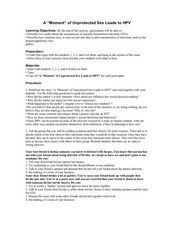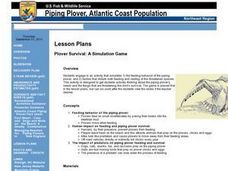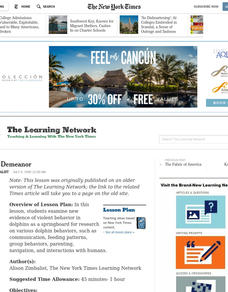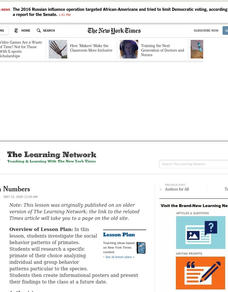Curated OER
Clip the Face
Young scholars discover the moon's phases and the rarity of eclipses. In this lunar lesson plan, students view a video titled Spin Around the Solar System: A Moon Dance, which demonstrates the key differences between a lunar and solar...
Facing History and Ourselves
How Do Communities Define We and They?
Learners consider the categorization of people. For this community identity instructional activity, 6th graders examine community membership definitions and consider how those outside of the group view themselves. Learners analyze The...
Curated OER
Enrichment Activities - "Mrs. Frisby and the Rats of NIMH"
Fifth graders read the novel "Mrs. Frisby and the Rats of NIMH." They discuss the various characters in the book, and the different types of conflict that take place within the book. They also research owls and rats to make comparisons...
Curated OER
Activities of the Immune System (Activity 1)
Students cut an apple in half and cover half with plastic wrap. They place drops of liquid on each half and discover how our skin protects us. They answer discussion questions to end the lesson.
Curated OER
All About the Human Life Cycle
In this life cycle worksheet, students read about the butterfly life cycle and draw pictures about it. Students draw 2 pictures and answer 2 short answer questions about the life cycle.
Curated OER
Predator/Prey Activity: Fish Feeding, Environments, and General Behavior
Students explore concepts of environment and survival among different marine life, focusing on the ocean environment.
Smithsonian Institution
Of Human Bondage: George Washington and The Issue of Slavery
Learners read and interpret four documents George Washington wrote regarding his slaves. They analyze why George Washington was conflicted over the issue of slavery. They discuss the evolution of Washington's attitude toward slavery.
Facing History and Ourselves
Do You Take the Oath?
Why did so many go along with Nazi policies during World War II? An investigatory unit includes four handouts, reading analyses, classroom discussion topics, and intriguing philosophical questions, helping learners understand the...
Peace Corps
Community
What is a community? Find out with a lesson that sheds light onto the different types of communities—school, local, and global. Scholars read informational text detailing the life of a young girl from Cape Verde and take part in a...
Facing History and Ourselves
Decision-Making: Introduction to the Unit
Make your classroom a supportive and communicative place to be before beginning a unit on the Holocaust. Working together as a class, learners reflect on their previous experiences of classroom discussions before establishing a...
College Board
AP® Psychology: Teaching Statistics and Research Methodology
Psychologists use statistics? Scholars investigate the research behind the methodology of statistical analysis. Using hands-on practice, case-studies, and scatterplots, they complete various tasks to understand the very roots of high...
Curated OER
The Illusion of Race
This is mostly an exploration of race through an interactive website, class readings, and discussion. Individuals take an online quiz about race, they answer questions on a worksheet by visiting another website, and discover that race is...
Curated OER
Uniform Design
Students investigate the military by examining their uniforms. For this design lesson, students analyze the military uniforms from different locations and time periods. Students create new ideas for current military uniforms.
Curated OER
A "Moment" of Unprotected Sex Leads to HPV
In a health class, participants read a story about a young woman who contacted HPV. The story is not included in the lesson plan, but is easily located on the Internet. The teacher then describes different scenarios for individuals to...
Curated OER
Plover Survival: A Simulation Game
Seventh graders engage in a simulation that explains the feeding behavior of the piping plover and the things that disturb the feeding and nesting of this species.
Curated OER
Tall, Dark, and Handsome
Seventh graders determine the characteristics of insect families after comparing human family characteristics. They categorize insects by looking for similar characteristics on image cards.
Curated OER
Dolphin Demeanor
Students examine new evidence of violent behavior in dolphins as a springboard for research on various dolphin behaviors, such as communication, feeding patterns, group behaviors, parenting, navigation, and interactions with humans.
Curated OER
Studying Birds in the Field
This is a well-designed science activity which helps students learn the behavior of different species of birds. Working with partners and in small team, students learn to scientifically observe birds.
Curated OER
Safety in Numbers
Students investigate social behavior patterns of primates. Next, students research a specific primate-analyzing individual and group behavior patterns particular to the species. They create informational posters and present findings to...
Curated OER
Mammals: Mammals and Their Ways
Students, in groups, observe, collect data, and analyze mammal behaviors.
Curated OER
Naturral Born Robots: Robots Have Feelings Too
Young scholars explore robotics. They design a simple device that simulates a human arm lifting a mass. Students test the strength of their arm. Young scholars discuss artificial intelligence.
Curated OER
Hatching Chickens
Students observe chicks hatching from eggs. For this science lesson, students view a video to develop an understanding of the proper care and needs of eggs and live animals. This is a great precursor activity for hatching eggs in class.
Curated OER
Geography: Water, Water Everywhere
Students discuss flooding and its causes. They view a Powerpoint presentation about floods and prevention methods. After creating a model with clay and pans, they investigate river behavior in various terrains with different amounts of...
Curated OER
Effects of Water Pollution on Aquatic Organisms
Learners investigate water pollution. They develop an understanding of the behavior of organisms, of the structure and properties of matter, and of natural and human induced hazards by conducting lab tests. They present their data...

























